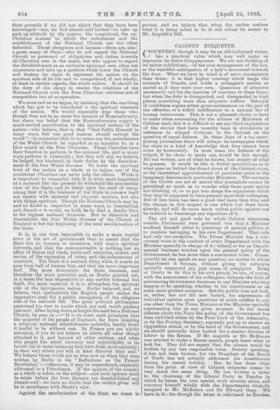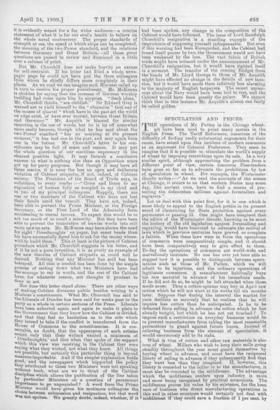CABINET ETIQUETTE.
COURTESY, though it may be an old-fashioned virtue, has a practical value which may well make us deprecate its entire disappearance. We are not thinking of its minor exhibitions,—of the nice management of the hat; or the watchful anticipation of a lady's movement towards the door. What we have in mind is of more consequence than these: it is that higher courtesy which keeps the counsels of friends, and holds a colleague's secrets as sacred as if they were your own. Questions of etiquette necessarily call for the exercise of courtesy in these 'ways; but when the duty is disregarded, and disregarded in high places, something more than etiquette suffers. Betrayal of confidence argues either gross carelessness on the part of the offender, or a wilful indifference to a natural law of human intercourse. This is not a pleasant choice to have to make when accounting for the actions of Ministers of Cabinet rank, but it is difficult to see any third explanation of the stories that have recently been in circulation in reference to alleged divisions in the Cabinet on the question of naval defence. In these days of a too enter- prising journalism there will always be newspapers which lay claim to a kind of knowledge that they cannot have come by honourably. In most cases the defence of the culprit, if he chose to make one, would be fair enough. He has written, not of what he knows, but simply of what he guesses. It would be idle to forbid speculations as to what goes on behind the closed doors of the Cabinet-room', or the theoretical apportionment of particular parts in the imaginary discussion to particular Ministers. The servants of the Crown are not so sacred that journalists cannot be permitted so much as to wonder what these great spirits are thinking of, or to put into shape the arguments which they may be supposed to have pressed upon their colleagues. But of late there has been a good deal more than this, and. the change in this respect is one which has done harm already, and will do more harm unless public opinion can be induced to discourage any repetition of it.
The old and good rule by which Cabinet utterances outside Parliament were governed was that a Minister confined himself either to questions of general politics or to matters belonging to his own Department. That rule had only one exception. The Prime Minister has a con- current voice in the conduct of every Department with the Minister specially in charge of it ; indeed, so far as Depart- mental business touches upon the general policy of the Government, he has more than a concurrent voice. Conse- quently he can speak on any question, no matter to whose Department it belongs, without giving the colleague specially concerned any just cause of complaint. Being at liberty to do this in his own person, he can, of course, with the concurrence of his colleagues, delegate the duty of announcing Government decisions to any Minister who may happen to be speaking, whether to his constituents or on some more general occasion. But the public does not look, or, rather, has not till now looked, for expressions of individual opinion upon questions of acute conflict to any one other than the Prime Minister or the Minister specially representing him at any given moment. In the recent debates about the Navy the policy of the Government has been unfolded either by the First Lord of the Admiralty, or by the Foreign Secretary, expressly put up to answer an Opposition attack, or by the head of the Government, and we should naturally have looked for a similar division of labour in the Recess. If Mr. Asquith or Mr. McKenna was minded to make a Recess speech, people knew what to look for. They did not expect that the silence would be broken by any less responsible voice. Strictly speaking, it has not been broken, for the President of the Board of Trade has not actually addressed his constituents during his recent holiday. But he has done what from the point of view of Cabinet etiquette comes to very much the same thing. He has written a letter to the chairman of the Liberal Party in Dundee in which he leaves his own special work severely alone, and concerns himself wholly with the Departments titularly assigned to Mr. McKenna and Sir Edward Grey. We have in it—for though the letter is addressed to Dundee, it is evidently meant for a far wider audience—a 'concise. statement of what it is for our soul's health to believe on the whole naval controversy. The proper standards of strength at sea, the speed at which ships can be completed, the meaning of the two-Power standard, and the relations between Germany and Great Britain,—all these great questions are passed in review and dismissed in a little Over a column of print.
But Mr. Churchill does not make brevity an excuse for self-restraint. If his letter had filled a whole news- paper page he could not have put the three colleagues from whom he chiefly differs more completely in their places. As we read we can imagine each Minister called up in turn to receive his proper punishment. Mr. McKenna is chidden for saying that the increase of German warship building had come upon him by surprise. "Sneh ideas," Mr. Churchill thinks, "are childish." Sir Edward Grey is warned not to yield himself to the " obsession " that any of the causes of quarrel " which have in the past set the world on edge exist, or have ever existed, between Great Britain and Germany." Mr. Asquith is blamed for similar incaution in the use of words, but he is let off somewhat more easily because, though what he has said about the two-Power standard "has no meaning at tbe. present moment," it has had one in the past, and may again have one in the future. Mr. Churchill's letter to his con- stituents may be full of sense and reason. It may put the whole question of our maritime supremacy in the clearest possible light. It may furnish a conclusive answer to what is nothing else than an Opposition scare got up for party purposes. But though it may have all these merits, it is none the less an open and. deliberate violation of Cabinet etiquette, if not, indeed, of Cabinet secrecy. The President of the Board of Trade says, in substance, to every reader :—" Come and listen to my exposition of human folly as sampled in my chief and in two of my principal colleagues. happily, there are one or two members of the Cabinet who have not lost their heads amid the tumult. They have not, indeed, been able to prevent the Prime Minister, or the Foreign Secretary, or the First Lord of the Admiralty from ministering to unreal terrors. To expect this would be to ask too much of so small a minority. But they have been able to prevent the translation of unwise words into still more unwise acts. Mr. McKeuna may have shown the need for eight ' Dreadnoughts ' on paper, bat saner 1,304s than his have successfully dared him to ask for the money where- with to build them." This at least is the picture of Cabinet procedure which Mr. Churchill suggests in his letter, and if it be not a pure invention, it is as pretty an example of the new theories of Cabinet etiquette as could well be desired. Nothing that any Minister has said has been betrayed. All that is needed has been done by the simple Process of setting down what two Ministers have had the courage to say in. words, and the rest of the Cabinet have, for whatever reason, net thought it prudent to deny in act.
Nor does this letter stand alone. There are other ways of making Cabinet divisions public besides writing to a Minister's constituents. What Mr. Churchill has said to the Liberals of Dundee has been said for weeks past to the party as a whole in certain sections of the Press. Liberals have been exhorted again and again to make it plain to the Government that they know how the Cabinet is divided, and that they feel uo hesitation as to the side which they intend to take if the conflict is transferred from the Rouse of Commons to the constituencies. It is con- ceivable, no doubt, that the appearance of such articles Meant only that their writers wanted a minimum of Dreadnoughts,' and that when they spoke of the support Which this view was receiving in the Cabinet they were Saying what they wished, not what they knew. All things are possible, hilt certainly this particular thing is beyond measure improbable. And if the simpler explanation holds good, and the newspapers which supported the policy they attributed to these two Ministers were not speaking without book, what are we to think of the Cabinet ,discipline which allows the publication of the 'line taken PY particular Ministers on a question of paramount Importance to go unpunished? A word from the Prime Minister would have given his mutinous colleagues the ClIniee between submission and resignation, but that word WAS not spoken. We greatly doubt, indeed, whether, it it had been spoken, any change in the composition of the Cabinet would have followed. The issue of Lord Randolph Chirrchill's resignation is a standing example of the imprudence of supposing yourself indispensable. But even if this warning had been disregarded, and the Cabinet had found itself poorer by two, the Government would not have been weakened by the loss. The vast fabric of British, trade might have tottered under the announcement of Mr. Churchill's resignation, but it would have righted itself in a moment. The transfer of the coming Budget from the bands of Mr. Lloyd George to those of Mr. Asquith might have effected no change in the details of new taxa- tion, but it would have made them infinitely less alarming to the majority of English taxpayers. The recent uneasi- ness about the Navy would have been laid to rest, and the. Cabinet would have been greatly the gainer. We cannot think that in this instance Mr. Asquith's silence can fairly be called golden.























































 Previous page
Previous page